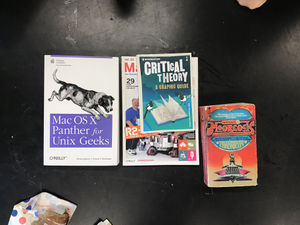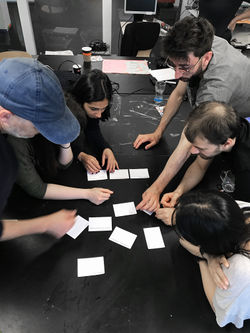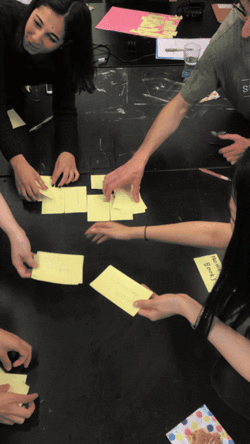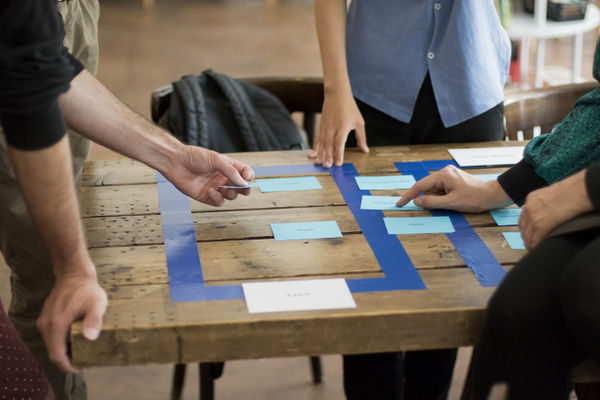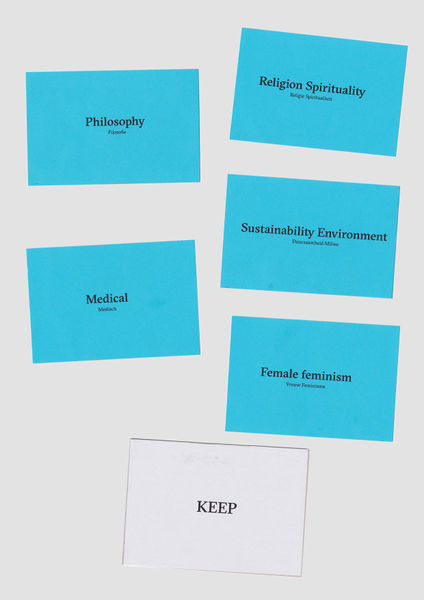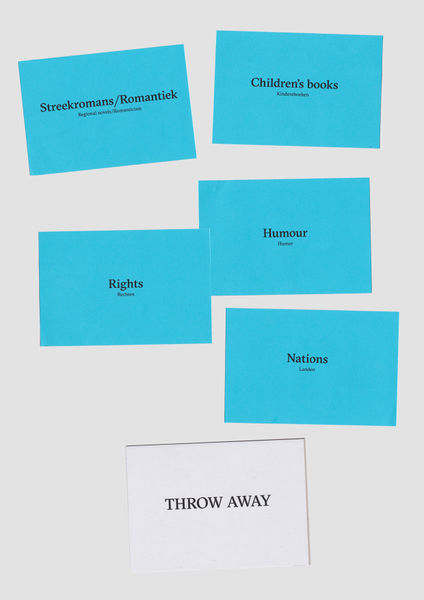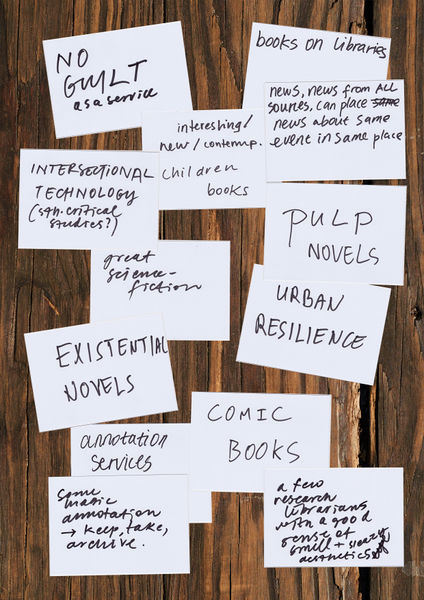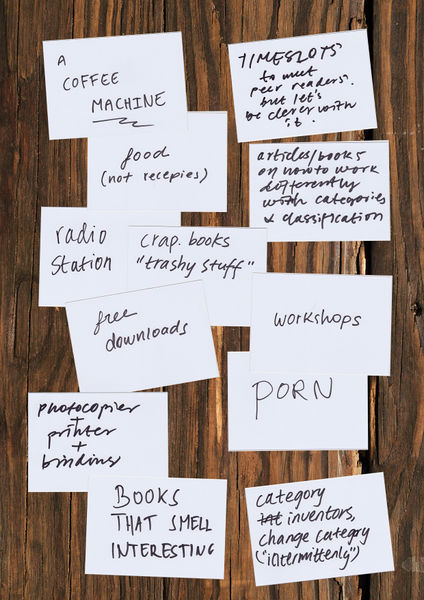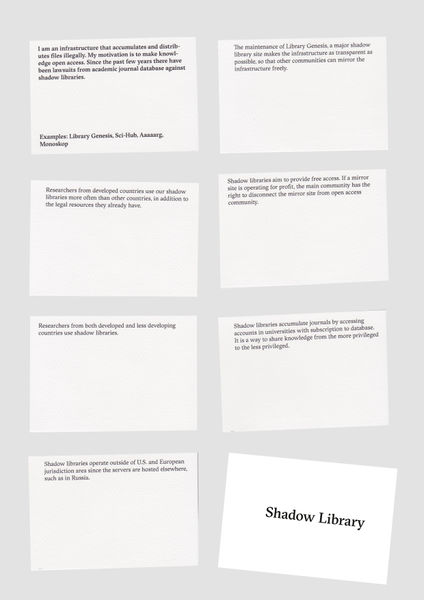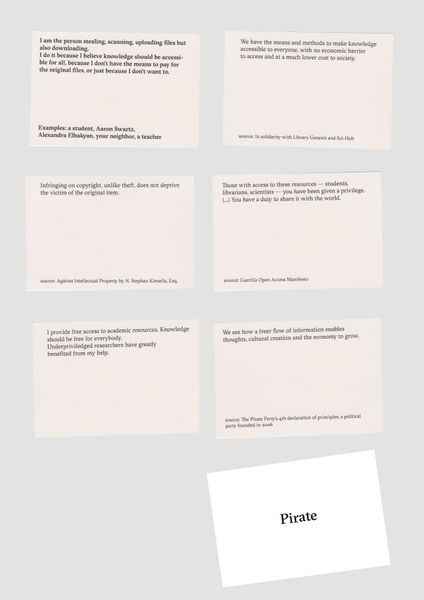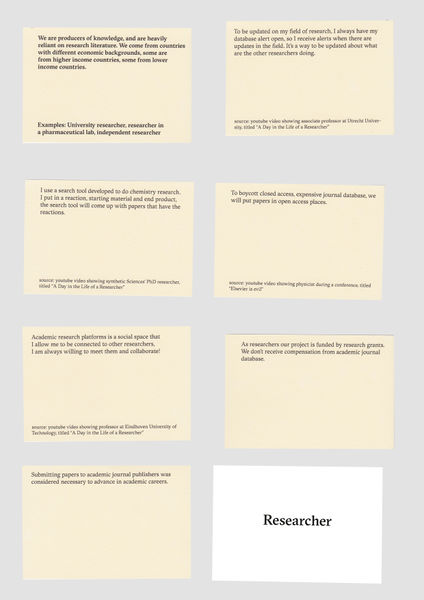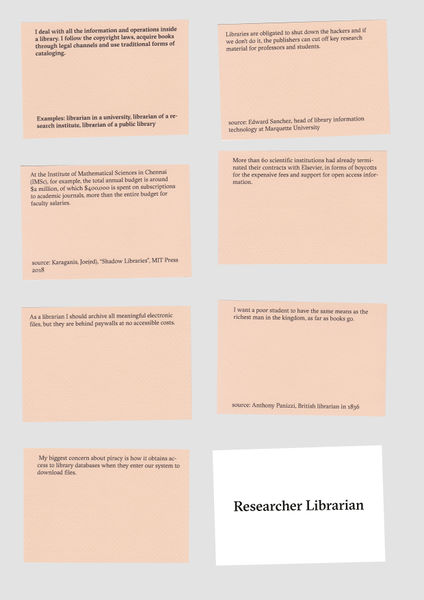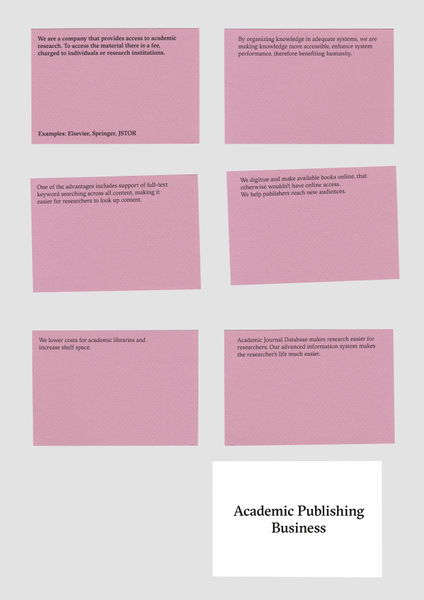Knowledge in action: Difference between revisions
(→Biyi) |
No edit summary |
||
| (25 intermediate revisions by 2 users not shown) | |||
| Line 1: | Line 1: | ||
== Personal Beginnings == | == Personal Beginnings == | ||
===Rita=== | ===Rita=== | ||
[[User:Rita_Graca/specialissue9#Prototyping]] | |||
===Biyi=== | ===Biyi=== | ||
==== Start to think differently about annotation, different forms of existences ==== | ==== Start to think differently about annotation, different forms of existences ==== | ||
| Line 8: | Line 11: | ||
You make annotations when you put a particular book with some neighbours on a library shelf ( Swiss robot library) | You make annotations when you put a particular book with some neighbours on a library shelf ( Swiss robot library) | ||
how can annotation can reveal community, person, or anecdote. | how can annotation can reveal community, person, or anecdote. | ||
annotation in computer vision algorithms | |||
https://www.buzzblogbox.com/2019/01/types-of-image-annotation-used-for-computer-vision.html | |||
====Giving Dignity to Annotations==== | ====Giving Dignity to Annotations==== | ||
| Line 19: | Line 25: | ||
- related to Bo's thoughts on digital labor acknowledgement. This may be a little far from the context we are situated now but, for example, decent digital labor accreditation is not offered and remained in shadows for jobs such as content reviewer and data set annotators. Their labor can be considered as works of annotations that's had not brought to light. | - related to Bo's thoughts on digital labor acknowledgement. This may be a little far from the context we are situated now but, for example, decent digital labor accreditation is not offered and remained in shadows for jobs such as content reviewer and data set annotators. Their labor can be considered as works of annotations that's had not brought to light. | ||
== | Stiegler note: | ||
retention space | |||
== Initial Individual Outlines == | |||
=== First Outline === | === First Outline === | ||
====Rita==== | ====Rita==== | ||
pad: https://pad.xpub.nl/p/IFL_22_05_19 | |||
Group project: create a library focused on the capacity of annotation.<br> | |||
What can be in this library besides books? How can we understand knowledge outside the written medium (books, articles, academic research...)<br> | |||
If we have different files, then what other forms of annotation, besides text annotation. Wants to explore this!<br> | |||
Examples of ways of annotating other media, as rapgenius.com, video annotation with time-stamps, video annotation on subtitles cues, hypothes.is, ...<br> | |||
How is this library going to be different than a cloud-folder? It is about 'sharing' -- making public. It means not only for ourselves but for a public. Because of time, the project will be first of all about why/how to annotate and maybe not about the notes themselves.<br> | |||
*What collection deserves to be made public? | |||
*Media-on-media annotation? | |||
*Stretching the categories of knowledge by adding other media? | |||
I find similarities with Artemis' project & Simon's? | |||
====Biyi==== | ====Biyi==== | ||
Aim: To facilitate a field for collective action and thinking, therefore challenging singular top-down direction in knowledge production [in particular in media, news, publishing industry]. As space and tools is given to annotation, I want to explore "curatability" of annotation, how can annotation be curated? Curated annotation is an archive, challenging authority of canonized, scholastic works. How? [In workshops of annotation, tools are given to experiment. Annotators are encouraged to gather and discuss opinions towards main content. Make a toolkit/framework for curating annotations. ] | |||
=== Second Outline === | === Second Outline === | ||
====Rita==== | ====Rita==== | ||
pad: https://pad.xpub.nl/p/IFL_22_05_19 | |||
Most of the subjects that we have been working on (such as piracy, file-sharing, and shadow libraries) work outside the law. | |||
Although illegal, sharing academic books seems to be morally acceptable by most of us. | |||
But what happens if we are studying Cinema, and watching a film becomes our research? | |||
Is it different to download a book or a song? | |||
Aim:<br> | |||
*Invite people to make choices to start a conversation on what we find moral, immoral, ethical, what we perceive as knowledge, role of pirate libraries, the importance of sharing the culture... | |||
*Talk about these activities in a group, shed light upon these issues | |||
*Because what is moral/immoral is so personal, some interesting confrontations can happen | |||
*The place where the workshops will happen is important. It would be interesting to go outside the artist/activist bubble and have diverse opinions. | |||
But that can also be my role, to be the devil's advocate and ask more provoking questions. | |||
Practical example: | |||
*Conversation starters where you divide the participants based on a question: "Move right if you think stealing a book is different than downloading it", "Move back if you don't know what the legal implications of downloading a file are", "If you'd write a book, would you consider distributing it for free?", etc.<br> | |||
Is important to start with easy questions to set an entry point for the workshop and to get a sense of the practical knowledge of the participants (I found difficult in the launch of the special issue 8 to start explaining my research because I didn't know how much the person knew about networks, if they were very informed or not at all)<br> | |||
(Possible inspiration: "A day in the courtroom" by Eva Weinmayr; "Middle ground"; "Conditional design workbook") | |||
*New Knowledge: through the discussions between the participants. But how does my knowledge, what we learned, gets visible? | |||
*How is annotation being discussed here?<br> | |||
We can annotate the discussion: with other questions that come up, answers, notes... what could be an interesting way of doing this?<br> | |||
Thinking besides written notes<br> | |||
If this discussion is recorded then annotated on, several layers can be put together. <br> | |||
The workshop shouldn't be the end point, but the starting point of the annotation<br> | |||
*The questions should be related to the set of texts we are using as a group, quoting books, films, etc. | |||
*How to document the workshop? | |||
The annotations seem to be an important part of the documentation. | |||
*How will people interface with my project? | |||
====Biyi==== | ====Biyi==== | ||
=== | Workshop Title: Annotation Curation / Curating Pirate Library - Pirate Librarians, Diversifying Librarians | ||
Theme: Reorganizing Knowledge: Curating pirate libraries [Pirate Librarian], curating annotations [Annotation Librarian]. | |||
I use librarian to refer to roles of organizing, taking care of, distributing, sharing, communicating knowledge. | |||
Who is the librarian in context of online shadow libraries? | |||
On Library Genesis, the main interface provides a search field to look for books. | |||
It is unlinke the conventional library, where physical collections placed according to categories provides an overview of thematic relationship between books. | |||
On the other hand, Monoskop provides background insights to its collections, stored in Wiki format. | |||
Reader can browse around interested areas on the Wiki, gain an insight on specific knowledge fields and choose corresponding literature. | |||
This role of librarian is not a role that one individual is occupied with, but rather, | |||
Aim: As the audience become familiarized with know-hows of pirate library and annotation, | |||
I want to invite them to think and act further on how are pirate library and annotation tools capable of making structural changes to knowledge production? | |||
Via pirate libraries and collective annotation tools, can knowledge production happen on peer to peer basis, overcoming top-down paradigms of knowledge access barriers? | |||
By establishing more accessible, decentralized spaces and communities, the production of knowledge is being redefined by participating readers, annotators, collectors. | |||
New Knowledge: Arena book stacks | |||
Role of Annotation: Via collective annotation, people can discuss and share thoughts together. | |||
Annotation curation can give a active, well structured place or organizing thoughts coming from readers who do not hold authorship in the conventional sense. | |||
In this activity, readers are encouraged to shift their attention from reading the author to reading their peers. | |||
Make a better document for you - Make a better document for US. | |||
references of from Joca and Tash's project from the past speical issue on Librarianship. | |||
Self librarianship - there is Amazon these days, why need librarians? Algorithmic librarianship, how is work being reformed ? redistributed? | |||
Are amazon reviewers librarians? | |||
Self-responsibilizaiton | |||
Comment: How will people interface to your project? | |||
==Interview with Leeszaal Librarians== | |||
===Introduction=== | |||
We were interested in the hidden processes that libraries go through, such as the selection of books, their categorization, the organization of the shelves. With these questions in mind, we interviewed Ronny and Laura, who are volunteer librarians at Leeszaal. They generously introduced to us the basics of how Leeszaal operates. Leeszaal is a particular reading room here in the Rotterdam West as it stands between a community center and library. | |||
We were surprised by the number of books that travel in and out of this place, the flexibility of not having to catalog incoming books to fullest details. For example, a looser notion of a category is used here, compared to research libraries. The meaning of what a library is, who does it serve, became clearer and broader to us. From illegal libraries that try to offer everything they can put their hands on, to particular curated content or personal reading lists, the circulation of knowledge can occur in different forms. | |||
===Transcription=== | |||
XPUB: Could you introduce yourself and tell us what you do in Leeszaal? | |||
Ronny: Yes. My name is Ronny, I am 32 years old. I've been volunteering here for almost three and a half years. I am part of the books team, which receives books on weekly basis. We receive books that are donated in boxes. They come in sometimes thirty boxes per week, sometimes ten boxes. They need to be sorted into categories afterwards. I studied in Haifa University in Israel and I worked a bit in the library there but now I work in Rotterdam School of Management. Although it's not related to libraries it is related to education, so I like the combination. My father is Dutch and it was our dream to come back to the Netherlands so when it was economically possible, we came. | |||
Laura: I work in a library but I didn’t study library science. I studied classical languages, Greek and Latin, but I've been working in a library for 15 years now. | |||
XPUB: Is Leeszaal a reading room, or do you call it a library? | |||
Laura: It's a volunteer library, but there are differences with normal libraries. It's kind of unique concept. | |||
Laura: It's unique because the books are free, you don't have to be a member of the Leeszaal. You can just walk in, take a book and walk out. We don't ask your name, we don't ask you to show us which books you are going to take. | |||
Ronny: And you don't have to bring them back. You can choose to bring them back, or bring something else. | |||
XPUB: Do people bring the books back? | |||
Ronny: Not usually. But sometimes they do. | |||
XPUB:Where do the books in Leeszaal come from? | |||
Laura: Most books come from normal people, people from Rotterdam. Sometimes, when someone dies, his or her books come here. Most of the time the books are just from people who are not going to read them anymore and they don't like the idea of throwing away books as garbage. | |||
Ronny: For example if the kids are grown, the parents give away books that are no longer suitable for them. | |||
Laura: We have to sort everything that comes in here. | |||
XPUB: What would be the normal path for a book after arriving in Leeszaal? | |||
Ronny: Laura comes in three times per week to sort the books that arrive into categories. | |||
Laura: The first step is to decide if will we keep the book or not. Stastistically, we filter out half of the donation. This happens because they are too old, too dirty, or because it's a title that we have ten times already. So there are lot of reasons to throw book away. | |||
Ronny: For the books we don't want we have containers back here, and there’s a company that comes and recycle them. Sometimes twice a week, sometimes once a week. It's really a lot of books! | |||
XPUB: Do you see annotations often? Would that be a reason to not keep a book? | |||
Laura: Yeah, for me that can be a problem. If there are all kind of colors on the page, or everything is written, ... I don't think I will keep it. | |||
XPUB: Do you often receive repetitive titles; such as Harry Potter? What do you do with them? | |||
Laura: Yes, in case of Harry Potter we will keep because they will also be picked up quickly. Some books are less popular, and are brought here really often. For example the gift books, which you get for free when you buy a book during the book week. Look, for example we have here one that it's from the yearly book fair, and came in for free when you purchase a book. Lots of people have such books. And they don't even read them. We can't keep all of these books. | |||
Ronny: Or those that are popular during the 90s, 80s, some of them we still keep, but if we get like ten copies of the same one then, it's not necessary. They are not popular anymore. | |||
XPUB: Do you usually see people wanting certain books from a certain category? Is there high demand for particular categories? | |||
Laura: Philosophy, everyone seems to like philosophy! | |||
Ronny: And psychology and art, religion sometimes. | |||
XPUB: Is there the case where these books have more donations as well? | |||
Laura: No. Sometimes people keep asking for a book and we don’t have anything left on the shelves. | |||
XPUB: What can you tell us about the organization of the shelves? | |||
Laura: The novels are in alphabetical order. | |||
Ronny: The English novels as well, but not the rest. This such a small collection that you can see within 10 minutes if we have something you want. The time that we would invest in alphabetization it is not worth it. We also don’t have a catalog, it would take us so much time it becomes impossible. | |||
Laura: Yes, in some weeks we receive over a thousand books. | |||
Ronny: It takes out all the fun if you have to worry about cataloging. | |||
XPUB: Can you tell us a bit about what are the visitors like? Who comes here? | |||
Ronny: Everybody. It's young families, old people, middle aged people, adults, Dutch and foreigners, if they know about this place. Sometimes groups come here from other cities in the Netherlands, sometimes teachers with students. | |||
Laura: And homeless people. They don't come here for the books but to have a place to sit, that's also ok. If they behave alright. | |||
XPUB: What is allowed in this space? Is it possible to copy the books? | |||
Ronny: We don't have photocopy machines, only computers at the aisle for public use. | |||
Ronny and Laura: We have rules like no alcohol, and people should behave themselves. For each category we have rules for how many books you can take per day. So nobody will come with a container and take 50 books. Because that is not the intention. Just respect each other and listen to the volunteers, and don't make too much noise. | |||
XPUB: What is the role of Leeszaal, does it go beyond the books? We saw that you have a full agenda of workshops and other activities. | |||
Ronny: It's something between a community center and library, maybe, you could say. Because all the activities. And there is also a Dutch lesson. | |||
Laura: Yes, Cafe NL. | |||
Ronny: There are language related events on a weekly basis, also in the evenings there are some music events, or cultural events. Each time it's something else. Every Thursday evening there is something with the dinner. The intention is to attract people from different backgrounds, to be wide. | |||
XPUB: We also saw Linux presentation day. | |||
Ronny and Laura: That's twice a year. | |||
XPUB: Is it very often that people approach Leeszaal with a project? | |||
Ronny: There are some projects sometimes, it is possible. If people are interested they talk to the volunteers, Usually it's possible. | |||
Ronny: The room where we are now stores books, but is also used for other projects. Sometimes we want to make a full space with books about cats. So we collect them for a few months, we put them in boxes and we think about a day when we can display them, and then we do it. So this room is also for these projects. | |||
Ronny: The projects happen at least once a month. | |||
Laura: As often as we want to. | |||
Ronny: When we have a good idea to begin to pay more attention to cat books, or books about Dante, and we start to put them aside. We put the books on a shelf where they can see it more easily, to attract attention, to show that we try our best. | |||
XPUB: The cat’s books, did it happen? | |||
Laura: Yes! Twice. People really like it. | |||
XPUB: How do you think of librarians being a gendered role? | |||
Biyi: I’m really curious because my grandmother studied biology and then, because of life circumstances, 5 or 10 years before her retirement, she became a librarian and I started to become more aware of this gender role of the female librarian. | |||
Ronny: In Haifa University most of the students were women but also some men. | |||
Biyi: More of the people who chose to study librarian sciences? | |||
Ronny: Yes, it’s more a feminine profession. | |||
XPUB: Do you have many volunteers working here? | |||
Laura: We have over 100 volunteers now. | |||
XPUB: Thank you! That's all of our questions. | |||
*This interview has been edited for content. | |||
== Third Outline (Collective of Rita & Biyi)== | |||
After our interviews with Leeszaal, we will turn the questions to our audience, and encourage them to make decisions. | |||
(it's ok here to adapt a more provocative tone.) | |||
Proposal: A system to facilitate discussion around librarianship on a more personal level. | |||
Why: In different ways, all workshops try to bring hidden, marginal processes to the light. | |||
Our workshop would like to turn the discussions about libraries, books, copyright and piracy from abstract concepts to real experiences. | |||
Goal: Not only sharing the same opinions and discussing new ones but creating small communities. | |||
For example, by saying that we all download books we aknowledge the issue. | |||
Physical outcome: | |||
How to do: | |||
Make it spatial: (a reference is Middleground, Joana Chicau workshop, https://hackersanddesigners.nl/s/Summer_Academy_2018/p/Media_Choreographies:_rehearsal_series make the space as an axis to generate feedback) | |||
can getting rid of the screen be an option? because the screen is a distraction because it's so centered! | |||
we can divide the space | |||
would be nice to let audience have chance to witness a documentation of workshop output | |||
Our input: | |||
We want to also provide input, and weave the input in a nice way during the question/discussion (not only rely on their answers, and it results some kind of "consumer questionaire poll" | |||
We enrich the discussion by providing background stories, small texts/articles, information | |||
Tools: Is there any prototyping tool that would add value? help in some way? | |||
Examples of questions: (start with more "easy" questions) | |||
1. I bought books from physical bookstores recently. | |||
2. I bought books from online platforms recently. sub qustion: I bought the books from (which), (which), (which) platform. I buy from (which) platform most. | |||
3. I follow suggestions from online platform recommendations, I found them useful. | |||
4. I downloaded online pirate copies of books. | |||
5. I made purchases of legal digital copies of books. | |||
6. I keep a record of my book collections. | |||
7. I bought a book in the last month. | |||
8. I downloaded a book in the last month. | |||
9. I've been in a library where the librarian was a male. | |||
10. I think it's morally different to download a book or to download a movie. | |||
assume identities? roles? new roles - the algorhyhm writer for book recommendation/ the server manager | |||
Leads for discussion after questions are asked: | |||
Can you describe the books in your home? What books do you have more, and what books you don't have? | |||
Documentation Method: | |||
Goal: To gather preliminary schemes, outputs during the event, feedbacks for the publication | |||
Method: Recording the workshop using voice recording | |||
!! The "data", the answers are not that important, is the discussion we want to document and find worth to keep. | |||
Dramaturg, Actions | |||
1. Circulate in the room, just keep walking. If you download files illegally stop walking. | |||
2. people stop or not | |||
3. Make other questions | |||
4. We regroup and continue the discussion. Asking about what they would like to see in these platforms, etc. | |||
5. We provide a piece of text, articles, inform about a specific case, a law, ... | |||
Another action begins | |||
Geometry for spatial division | |||
<photo> | |||
Props for posture | |||
<photo> | |||
==Feedback from Femke== | |||
Feedback with Femke | |||
pointed out the limits the questions have. For example, there is an unfairness to ask on level of the individual about their choices, it could be limiting, that people choose this/that because they don’t have other options.. The suggestion is that we formulate the questions in more productive ways, to open them up, avoid putting pressure on the individual (for example use strategies such as imagine what future library be? Or role assuming - what would you do if you are...the publisher?/the reader? the librarian? ) | |||
Re-enact the relationships between academic publishers/archive, such as Elsevir, JStor, MIT Press. | |||
== Test Runs == | == Test Runs == | ||
Through role-play, you will perform the activities crucial to the sustenance of libraries. You will interpret and reimagine the actors that take part in knowledge production and distribution, such as the librarian, the researcher, the pirate, the publisher, the reader, the writer, the student, the copyist, the printer.
<br> | |||
The workshop consists of three activities where different scenarios shift your accustomed perspective to start common dialogues. Put yourselves in the shoes of the librarian, imagine together a reading space, and contest the morality of knowledge ownership. | |||
Workshop with 3 activities<br> | |||
'''ONE: Librarian's Choice''' | |||
1. We provide 10 books (updated to: the group chooses 10 books from the library). As a group you should decide on 5 books to keep, 5 to throw away. | |||
You are a librarian, try to think outside your personal preference. The group will have to debate to have agreement. | |||
2. As a second action, we ask you to re-think the decisions, now based on specific situations. You are the librarian:<br> | |||
* Decide on what books to keep for a leisure library<br> | |||
* Decide on what books to keep for a retirement house<br> | |||
* Decide on what books to keep for a book café<br> | |||
Did anything change?<br> | |||
3. As a third action, you decide now over book categories. We provide 10 categories from Willem de Kooning library, the group should decide on 5 to keep, 5 to throw away. | |||
[[File:excluded_books.jpg | 300px | thumbnail | left | Excluded books from the first round]] | |||
[[File:categories.jpg | 250px | thumbnail | left | Choosing between library categories]] | |||
<br clear=all> | |||
'''TWO: Perfect Library''' | |||
1. Think now as a user, the reader, the library goer. The goal is to create our collective perfect library. We provide post-its and ask you to: | |||
* Write three categories of books you would like to have. | |||
* Think about furniture/spaces. | |||
* Custom/random stuff. | |||
2. You should all think about the organization of the categories and organization of the space. What books are near what? | |||
Second round:<br> | |||
3. Look to Willem de Kooning library now. Revise the categories. | |||
* Write three categories you would like to have in your perfect library | |||
* Browse around the library shelves and see if they have your categories | |||
* Think about the three categories you wrote in action 1. How do these categories fit in current categories? Write your category proposal on tags, insert them where you'd like them to be. | |||
Are the spaces you imagined in action 1 present? | |||
[[File:activity2.gif | 250px | thumbnail | left | Creating together an ideal library]] | |||
<br clear=all> | |||
'''THREE: Future Library''' | |||
* Choose a role/character. | |||
* Take some time to read the quotes and familiarize with your character. | |||
* We provide a case. | |||
* You should defend your character's best interests. Make use of the quotes if you want, but feel free to improvise. | |||
CASE 1: Ming recently graduated from a Chinese University, so she lost access to academic research database subscription. The academic resource access is way to expensive for her. Her nearest library is actually very good in providing the resources, however she prefers writing at home where she can be alone. She uses shadow libraries to access research materials. <br> | |||
Speak from the best interest of the roles you have selected and interpret the scenario. | |||
Second round: | |||
CASE 2: A researcher just made significant discoveries in a particular field and would like to make the work available to as many people as possible.<br> | |||
Speak from the best interest of the roles you have selected and interpret the scenario. | |||
'''Feedback from Femke:'''<br> | |||
Great you found multiple ways to play out and discuss complex questions around libraries, categorisation, legality, inclusion and exclusion. The three formats are quite different and that adds to the space for reflection that you open up. | |||
Maybe in your introduction, you can explain why you took this specific direction: why are you interested in the subject matter(s) and methods. | |||
The connection to the Leeszaal selection process is great. | |||
You could spatialize/theatricalize the actions a lot more: what does the ‘keep’ and ‘throw’ areas look like (is there a bin?), badges for the roles ... | |||
In general: transitions between ‘rounds’ seem a bit abrupt (but there is obviously a story interconnecting them). After 2nd round: It seems important to think about the flow between the three parts (that now feel more like two parts). How are the parts conceptually connected or maybe more clearly differentiated? How do you explain their relation, or their difference? Perhaps think of a way to connect all three through the question of inclusion/exclusion? | |||
From the first test: The ‘ideal library’ is a bit of a generic question and risks to lead to quite predictable generic proposals (a beanbag ;-)). Maybe think of ways to push the categories a bit more, and to ask people to think of an ideal library for these specific categories. | |||
The pre-selected categories could be made more challenging: in relation to Leeszaal, and in relation to thinking about inclusion/exclusion (can you find more ambiguous, conflicting or otherwise problematic categories?). How can you choose them in such a way that they produce discussion, tension (different scales, levels of formality …) | |||
The part introducing ‘choose your categories’ could be a bit sharper formulated I feel, to really challenge participants to try out what categories can do, and how they might differ from person to person. | |||
The role game in the end works very well. Of course the ‘flashcards’ could do with some more work. They are a good vehicle, not just for the workshop but seem to provide you with a useful structure to think through Issue #9. | |||
We all felt that the players should have a bit more time with the role, and be asked to introduce (we tried it, it worked). You could play both a role in this round, to spice up the discussion. You could be Ming for example! | |||
Works well to come back to what happened at the end and reflect with the participants. | |||
== Event == | == Event == | ||
=== The Library is Open, Leeszaal === | |||
[[File:knowledge_in_action.jpg|600px |thumbnail|left]] | |||
<br clear=all> | |||
'''ACTIVITY ONE — Librarian's Choice''' | |||
A librarian is challenged with the task of choosing books from the large amounts that come to the library regularly. Before any categorization, the destiny of the book is determined: to keep, or to throw away.<br> | |||
In this activity, we ask you to represent the librarian and make choices like one. When we perform these processes of selection we understand how one's understanding of what should be displayed influences knowledge circulation. | |||
1. In this first activity, you are assigned to the role of the librarian, please walk around bookshelves in Leeszaal and select a book. | |||
2. Now, we will ask you to decide in a group which half of the books to keep, which to throw away. | |||
Remember that you are a librarian, try to think outside your personal preference. | |||
3. We will give you a scenario. | |||
*Decide on what books to keep/throw away for a shadow library. | |||
*Decide on what books to keep/throw away for a research university. | |||
Did anything change? | |||
3. As a third action, you decide now over book categories. We provide some categories from Leeszaal shelves, the group should decide on half to keep, half to take away from Leeszaal Library. | |||
*Sustainability Environment | |||
*Religion Spirituality | |||
*Rights | |||
*Medical | |||
*Humour | |||
*Female feminism | |||
*Regional novels / Romanticism | |||
*Nations | |||
*Philosophy | |||
*Children's books | |||
<gallery heights=400px mode=packed style="text-align:left"> | |||
keep.jpg|First group choices: keep | |||
throw_away.jpg|First group choices: throw away | |||
</gallery> | |||
'''ACTIVITY TWO — Ideal Library''' | |||
When we use libraries we usually desire a certain service and expect specific behaviors. However, the creation of shadow libraries has changed a lot of predefined ideas: you don't need authorization to read, you don't need to be in a quiet room, maybe you don't need a librarian. In this activity, the participants are asked to imagine new places and to eradicate preconceived ideas about these places. By doing so, we can conceptualize a future for libraries, where books, digital files, and other spaces come together and stay relevant for us. | |||
1. Think now as a user, the reader, the library goer. The goal is to create our collective ideal library. We provide cards and ask you to: | |||
*Write three categories of books/files you would like to have. | |||
*Think about spaces. (space for yourself, space for collective reading, space in transit...) | |||
*Imagine a scope of audiences (do you want to make it a safe space? invitation only? membership? radical openness? ) | |||
*Redesign the services (how does the library provide books? does it allow scanning? do you want a librarian? or a robot to organize the shelves? e.g. in Leeszaal people can have the books forever, and in traditional libraries you need to return them in due time) | |||
You should all think about the organization of the categories and organization of the space. What books/spaces are near what? | |||
<gallery heights=400px mode=packed style="text-align:left"> | |||
cards.jpg|Ideal library according to the group | |||
cards2.jpg | |||
</gallery> | |||
'''ACTIVITY THREE — Discussion in the Library''' | |||
During the previous two activities, we become familiar with how do current libraries operate, and how may we imagine ideal libraries. The following activity takes you to a discussion that revolves the current phenomenon of the shadow libraries and open access, as a site for reorganizing of knowledge distribution. In this activity, you'll be assigned to roles that play a part in academic resources circulation. The discussion aims to map out relationships between these players, acknowledge friction and seek collaboration. | |||
*Choose a role/character. | |||
*We give quotes sourced from real characters. Take some time to read them and familiarize with your role. | |||
*We provide a case. | |||
*Start the discussion with a round of introductions: who are you, what do you defend? | |||
*You should defend your character's best interests. Make use of the quotes if you want, but feel free to improvise. | |||
Examples of cases: | |||
*Ming recently graduated from a Chinese University, so she lost access to her university resources. Should she make a way to pay the expensive academic journal database or use shadow libraries instead? Speak from the best interest of the roles you have selected and interpret the scenario. | |||
*A researcher just made significant discoveries in a particular field and would like to make the work available to as many people as possible. Speak from the best interest of the roles you have selected and interpret the scenario. | |||
Roles: | |||
*Academic Publishing Business | |||
*Pirate | |||
*Researcher | |||
*Research Librarian | |||
*Shadow Library | |||
<gallery heights=400px mode=packed style="text-align:left"> | |||
shadow_library.jpg | |||
shadow_librarian.jpg | |||
researcher.jpg | |||
researcher_librarian.jpg | |||
publishing_company.jpg | |||
</gallery> | |||
==Dubravka Interview== | |||
projects of Memory of the World | |||
Latest revision as of 10:21, 10 July 2019
Personal Beginnings
Rita
User:Rita_Graca/specialissue9#Prototyping
Biyi
Start to think differently about annotation, different forms of existences
how annotation is from the people can make categorization. in some libraries, people pull books out and put them back on a big stack these stacks of books placed together can be a form of annotation too. their interests are placed there, some links are formed that weren't there before You make annotations when you put a particular book with some neighbours on a library shelf ( Swiss robot library) how can annotation can reveal community, person, or anecdote.
annotation in computer vision algorithms https://www.buzzblogbox.com/2019/01/types-of-image-annotation-used-for-computer-vision.html
Giving Dignity to Annotations
Inspired by discussion of a proposal by Tancre to follow git-workflow. A library that people can fork. This would work with epub. A platform/library for annotations. Structure of epub could somehow work within git. The desire for annotation: accrediting value to less authorized researchers/users. There are already a lot of annotation ideas/tools around (ref. Stiegler article, Toward a Geography of Knowledge https://westernchiasma.files.wordpress.com/2015/03/annotation-navigation-electronic-editions.pdf). Thinking about it as a way to practice other ways of producing knowledge. Questions: - How does annotation re-organise or re-confirm conventional modes of knowledge production? - What about the authorship of annotation? - How to curate annotations? Should there be a 'curator'-role invented? today's task, read Stiegler text on annotation and present to group. (Can also develop discussion from this idea during Steve's class) - related to Bo's thoughts on digital labor acknowledgement. This may be a little far from the context we are situated now but, for example, decent digital labor accreditation is not offered and remained in shadows for jobs such as content reviewer and data set annotators. Their labor can be considered as works of annotations that's had not brought to light.
Stiegler note: retention space
Initial Individual Outlines
First Outline
Rita
pad: https://pad.xpub.nl/p/IFL_22_05_19
Group project: create a library focused on the capacity of annotation.
What can be in this library besides books? How can we understand knowledge outside the written medium (books, articles, academic research...)
If we have different files, then what other forms of annotation, besides text annotation. Wants to explore this!
Examples of ways of annotating other media, as rapgenius.com, video annotation with time-stamps, video annotation on subtitles cues, hypothes.is, ...
How is this library going to be different than a cloud-folder? It is about 'sharing' -- making public. It means not only for ourselves but for a public. Because of time, the project will be first of all about why/how to annotate and maybe not about the notes themselves.
- What collection deserves to be made public?
- Media-on-media annotation?
- Stretching the categories of knowledge by adding other media?
I find similarities with Artemis' project & Simon's?
Biyi
Aim: To facilitate a field for collective action and thinking, therefore challenging singular top-down direction in knowledge production [in particular in media, news, publishing industry]. As space and tools is given to annotation, I want to explore "curatability" of annotation, how can annotation be curated? Curated annotation is an archive, challenging authority of canonized, scholastic works. How? [In workshops of annotation, tools are given to experiment. Annotators are encouraged to gather and discuss opinions towards main content. Make a toolkit/framework for curating annotations. ]
Second Outline
Rita
pad: https://pad.xpub.nl/p/IFL_22_05_19
Most of the subjects that we have been working on (such as piracy, file-sharing, and shadow libraries) work outside the law. Although illegal, sharing academic books seems to be morally acceptable by most of us. But what happens if we are studying Cinema, and watching a film becomes our research? Is it different to download a book or a song?
Aim:
- Invite people to make choices to start a conversation on what we find moral, immoral, ethical, what we perceive as knowledge, role of pirate libraries, the importance of sharing the culture...
- Talk about these activities in a group, shed light upon these issues
- Because what is moral/immoral is so personal, some interesting confrontations can happen
- The place where the workshops will happen is important. It would be interesting to go outside the artist/activist bubble and have diverse opinions.
But that can also be my role, to be the devil's advocate and ask more provoking questions.
Practical example:
- Conversation starters where you divide the participants based on a question: "Move right if you think stealing a book is different than downloading it", "Move back if you don't know what the legal implications of downloading a file are", "If you'd write a book, would you consider distributing it for free?", etc.
Is important to start with easy questions to set an entry point for the workshop and to get a sense of the practical knowledge of the participants (I found difficult in the launch of the special issue 8 to start explaining my research because I didn't know how much the person knew about networks, if they were very informed or not at all)
(Possible inspiration: "A day in the courtroom" by Eva Weinmayr; "Middle ground"; "Conditional design workbook")
- New Knowledge: through the discussions between the participants. But how does my knowledge, what we learned, gets visible?
- How is annotation being discussed here?
We can annotate the discussion: with other questions that come up, answers, notes... what could be an interesting way of doing this?
Thinking besides written notes
If this discussion is recorded then annotated on, several layers can be put together.
The workshop shouldn't be the end point, but the starting point of the annotation
- The questions should be related to the set of texts we are using as a group, quoting books, films, etc.
- How to document the workshop?
The annotations seem to be an important part of the documentation.
- How will people interface with my project?
Biyi
Workshop Title: Annotation Curation / Curating Pirate Library - Pirate Librarians, Diversifying Librarians
Theme: Reorganizing Knowledge: Curating pirate libraries [Pirate Librarian], curating annotations [Annotation Librarian]. I use librarian to refer to roles of organizing, taking care of, distributing, sharing, communicating knowledge. Who is the librarian in context of online shadow libraries? On Library Genesis, the main interface provides a search field to look for books. It is unlinke the conventional library, where physical collections placed according to categories provides an overview of thematic relationship between books. On the other hand, Monoskop provides background insights to its collections, stored in Wiki format. Reader can browse around interested areas on the Wiki, gain an insight on specific knowledge fields and choose corresponding literature. This role of librarian is not a role that one individual is occupied with, but rather,
Aim: As the audience become familiarized with know-hows of pirate library and annotation, I want to invite them to think and act further on how are pirate library and annotation tools capable of making structural changes to knowledge production? Via pirate libraries and collective annotation tools, can knowledge production happen on peer to peer basis, overcoming top-down paradigms of knowledge access barriers? By establishing more accessible, decentralized spaces and communities, the production of knowledge is being redefined by participating readers, annotators, collectors.
New Knowledge: Arena book stacks
Role of Annotation: Via collective annotation, people can discuss and share thoughts together. Annotation curation can give a active, well structured place or organizing thoughts coming from readers who do not hold authorship in the conventional sense. In this activity, readers are encouraged to shift their attention from reading the author to reading their peers. Make a better document for you - Make a better document for US.
references of from Joca and Tash's project from the past speical issue on Librarianship. Self librarianship - there is Amazon these days, why need librarians? Algorithmic librarianship, how is work being reformed ? redistributed? Are amazon reviewers librarians? Self-responsibilizaiton
Comment: How will people interface to your project?
Interview with Leeszaal Librarians
Introduction
We were interested in the hidden processes that libraries go through, such as the selection of books, their categorization, the organization of the shelves. With these questions in mind, we interviewed Ronny and Laura, who are volunteer librarians at Leeszaal. They generously introduced to us the basics of how Leeszaal operates. Leeszaal is a particular reading room here in the Rotterdam West as it stands between a community center and library. We were surprised by the number of books that travel in and out of this place, the flexibility of not having to catalog incoming books to fullest details. For example, a looser notion of a category is used here, compared to research libraries. The meaning of what a library is, who does it serve, became clearer and broader to us. From illegal libraries that try to offer everything they can put their hands on, to particular curated content or personal reading lists, the circulation of knowledge can occur in different forms.
Transcription
XPUB: Could you introduce yourself and tell us what you do in Leeszaal? Ronny: Yes. My name is Ronny, I am 32 years old. I've been volunteering here for almost three and a half years. I am part of the books team, which receives books on weekly basis. We receive books that are donated in boxes. They come in sometimes thirty boxes per week, sometimes ten boxes. They need to be sorted into categories afterwards. I studied in Haifa University in Israel and I worked a bit in the library there but now I work in Rotterdam School of Management. Although it's not related to libraries it is related to education, so I like the combination. My father is Dutch and it was our dream to come back to the Netherlands so when it was economically possible, we came. Laura: I work in a library but I didn’t study library science. I studied classical languages, Greek and Latin, but I've been working in a library for 15 years now.
XPUB: Is Leeszaal a reading room, or do you call it a library? Laura: It's a volunteer library, but there are differences with normal libraries. It's kind of unique concept. Laura: It's unique because the books are free, you don't have to be a member of the Leeszaal. You can just walk in, take a book and walk out. We don't ask your name, we don't ask you to show us which books you are going to take. Ronny: And you don't have to bring them back. You can choose to bring them back, or bring something else.
XPUB: Do people bring the books back? Ronny: Not usually. But sometimes they do.
XPUB:Where do the books in Leeszaal come from? Laura: Most books come from normal people, people from Rotterdam. Sometimes, when someone dies, his or her books come here. Most of the time the books are just from people who are not going to read them anymore and they don't like the idea of throwing away books as garbage. Ronny: For example if the kids are grown, the parents give away books that are no longer suitable for them. Laura: We have to sort everything that comes in here.
XPUB: What would be the normal path for a book after arriving in Leeszaal? Ronny: Laura comes in three times per week to sort the books that arrive into categories. Laura: The first step is to decide if will we keep the book or not. Stastistically, we filter out half of the donation. This happens because they are too old, too dirty, or because it's a title that we have ten times already. So there are lot of reasons to throw book away. Ronny: For the books we don't want we have containers back here, and there’s a company that comes and recycle them. Sometimes twice a week, sometimes once a week. It's really a lot of books!
XPUB: Do you see annotations often? Would that be a reason to not keep a book? Laura: Yeah, for me that can be a problem. If there are all kind of colors on the page, or everything is written, ... I don't think I will keep it.
XPUB: Do you often receive repetitive titles; such as Harry Potter? What do you do with them? Laura: Yes, in case of Harry Potter we will keep because they will also be picked up quickly. Some books are less popular, and are brought here really often. For example the gift books, which you get for free when you buy a book during the book week. Look, for example we have here one that it's from the yearly book fair, and came in for free when you purchase a book. Lots of people have such books. And they don't even read them. We can't keep all of these books. Ronny: Or those that are popular during the 90s, 80s, some of them we still keep, but if we get like ten copies of the same one then, it's not necessary. They are not popular anymore.
XPUB: Do you usually see people wanting certain books from a certain category? Is there high demand for particular categories? Laura: Philosophy, everyone seems to like philosophy! Ronny: And psychology and art, religion sometimes.
XPUB: Is there the case where these books have more donations as well? Laura: No. Sometimes people keep asking for a book and we don’t have anything left on the shelves.
XPUB: What can you tell us about the organization of the shelves? Laura: The novels are in alphabetical order. Ronny: The English novels as well, but not the rest. This such a small collection that you can see within 10 minutes if we have something you want. The time that we would invest in alphabetization it is not worth it. We also don’t have a catalog, it would take us so much time it becomes impossible. Laura: Yes, in some weeks we receive over a thousand books. Ronny: It takes out all the fun if you have to worry about cataloging.
XPUB: Can you tell us a bit about what are the visitors like? Who comes here? Ronny: Everybody. It's young families, old people, middle aged people, adults, Dutch and foreigners, if they know about this place. Sometimes groups come here from other cities in the Netherlands, sometimes teachers with students. Laura: And homeless people. They don't come here for the books but to have a place to sit, that's also ok. If they behave alright.
XPUB: What is allowed in this space? Is it possible to copy the books? Ronny: We don't have photocopy machines, only computers at the aisle for public use. Ronny and Laura: We have rules like no alcohol, and people should behave themselves. For each category we have rules for how many books you can take per day. So nobody will come with a container and take 50 books. Because that is not the intention. Just respect each other and listen to the volunteers, and don't make too much noise.
XPUB: What is the role of Leeszaal, does it go beyond the books? We saw that you have a full agenda of workshops and other activities. Ronny: It's something between a community center and library, maybe, you could say. Because all the activities. And there is also a Dutch lesson. Laura: Yes, Cafe NL. Ronny: There are language related events on a weekly basis, also in the evenings there are some music events, or cultural events. Each time it's something else. Every Thursday evening there is something with the dinner. The intention is to attract people from different backgrounds, to be wide.
XPUB: We also saw Linux presentation day. Ronny and Laura: That's twice a year.
XPUB: Is it very often that people approach Leeszaal with a project? Ronny: There are some projects sometimes, it is possible. If people are interested they talk to the volunteers, Usually it's possible. Ronny: The room where we are now stores books, but is also used for other projects. Sometimes we want to make a full space with books about cats. So we collect them for a few months, we put them in boxes and we think about a day when we can display them, and then we do it. So this room is also for these projects. Ronny: The projects happen at least once a month. Laura: As often as we want to. Ronny: When we have a good idea to begin to pay more attention to cat books, or books about Dante, and we start to put them aside. We put the books on a shelf where they can see it more easily, to attract attention, to show that we try our best.
XPUB: The cat’s books, did it happen? Laura: Yes! Twice. People really like it.
XPUB: How do you think of librarians being a gendered role? Biyi: I’m really curious because my grandmother studied biology and then, because of life circumstances, 5 or 10 years before her retirement, she became a librarian and I started to become more aware of this gender role of the female librarian. Ronny: In Haifa University most of the students were women but also some men. Biyi: More of the people who chose to study librarian sciences? Ronny: Yes, it’s more a feminine profession.
XPUB: Do you have many volunteers working here? Laura: We have over 100 volunteers now.
XPUB: Thank you! That's all of our questions.
- This interview has been edited for content.
Third Outline (Collective of Rita & Biyi)
After our interviews with Leeszaal, we will turn the questions to our audience, and encourage them to make decisions. (it's ok here to adapt a more provocative tone.)
Proposal: A system to facilitate discussion around librarianship on a more personal level.
Why: In different ways, all workshops try to bring hidden, marginal processes to the light. Our workshop would like to turn the discussions about libraries, books, copyright and piracy from abstract concepts to real experiences.
Goal: Not only sharing the same opinions and discussing new ones but creating small communities. For example, by saying that we all download books we aknowledge the issue.
Physical outcome:
How to do: Make it spatial: (a reference is Middleground, Joana Chicau workshop, https://hackersanddesigners.nl/s/Summer_Academy_2018/p/Media_Choreographies:_rehearsal_series make the space as an axis to generate feedback) can getting rid of the screen be an option? because the screen is a distraction because it's so centered! we can divide the space would be nice to let audience have chance to witness a documentation of workshop output
Our input: We want to also provide input, and weave the input in a nice way during the question/discussion (not only rely on their answers, and it results some kind of "consumer questionaire poll" We enrich the discussion by providing background stories, small texts/articles, information
Tools: Is there any prototyping tool that would add value? help in some way?
Examples of questions: (start with more "easy" questions)
1. I bought books from physical bookstores recently. 2. I bought books from online platforms recently. sub qustion: I bought the books from (which), (which), (which) platform. I buy from (which) platform most. 3. I follow suggestions from online platform recommendations, I found them useful. 4. I downloaded online pirate copies of books. 5. I made purchases of legal digital copies of books. 6. I keep a record of my book collections. 7. I bought a book in the last month. 8. I downloaded a book in the last month. 9. I've been in a library where the librarian was a male. 10. I think it's morally different to download a book or to download a movie.
assume identities? roles? new roles - the algorhyhm writer for book recommendation/ the server manager
Leads for discussion after questions are asked: Can you describe the books in your home? What books do you have more, and what books you don't have?
Documentation Method: Goal: To gather preliminary schemes, outputs during the event, feedbacks for the publication Method: Recording the workshop using voice recording
!! The "data", the answers are not that important, is the discussion we want to document and find worth to keep.
Dramaturg, Actions
1. Circulate in the room, just keep walking. If you download files illegally stop walking.
2. people stop or not
3. Make other questions
4. We regroup and continue the discussion. Asking about what they would like to see in these platforms, etc.
5. We provide a piece of text, articles, inform about a specific case, a law, ...
Another action begins
Geometry for spatial division <photo> Props for posture <photo>
Feedback from Femke
Feedback with Femke pointed out the limits the questions have. For example, there is an unfairness to ask on level of the individual about their choices, it could be limiting, that people choose this/that because they don’t have other options.. The suggestion is that we formulate the questions in more productive ways, to open them up, avoid putting pressure on the individual (for example use strategies such as imagine what future library be? Or role assuming - what would you do if you are...the publisher?/the reader? the librarian? )
Re-enact the relationships between academic publishers/archive, such as Elsevir, JStor, MIT Press.
Test Runs
Through role-play, you will perform the activities crucial to the sustenance of libraries. You will interpret and reimagine the actors that take part in knowledge production and distribution, such as the librarian, the researcher, the pirate, the publisher, the reader, the writer, the student, the copyist, the printer.
The workshop consists of three activities where different scenarios shift your accustomed perspective to start common dialogues. Put yourselves in the shoes of the librarian, imagine together a reading space, and contest the morality of knowledge ownership.
Workshop with 3 activities
ONE: Librarian's Choice
1. We provide 10 books (updated to: the group chooses 10 books from the library). As a group you should decide on 5 books to keep, 5 to throw away. You are a librarian, try to think outside your personal preference. The group will have to debate to have agreement.
2. As a second action, we ask you to re-think the decisions, now based on specific situations. You are the librarian:
- Decide on what books to keep for a leisure library
- Decide on what books to keep for a retirement house
- Decide on what books to keep for a book café
Did anything change?
3. As a third action, you decide now over book categories. We provide 10 categories from Willem de Kooning library, the group should decide on 5 to keep, 5 to throw away.
TWO: Perfect Library
1. Think now as a user, the reader, the library goer. The goal is to create our collective perfect library. We provide post-its and ask you to:
- Write three categories of books you would like to have.
- Think about furniture/spaces.
- Custom/random stuff.
2. You should all think about the organization of the categories and organization of the space. What books are near what?
Second round:
3. Look to Willem de Kooning library now. Revise the categories.
- Write three categories you would like to have in your perfect library
- Browse around the library shelves and see if they have your categories
- Think about the three categories you wrote in action 1. How do these categories fit in current categories? Write your category proposal on tags, insert them where you'd like them to be.
Are the spaces you imagined in action 1 present?
THREE: Future Library
- Choose a role/character.
- Take some time to read the quotes and familiarize with your character.
- We provide a case.
- You should defend your character's best interests. Make use of the quotes if you want, but feel free to improvise.
CASE 1: Ming recently graduated from a Chinese University, so she lost access to academic research database subscription. The academic resource access is way to expensive for her. Her nearest library is actually very good in providing the resources, however she prefers writing at home where she can be alone. She uses shadow libraries to access research materials.
Speak from the best interest of the roles you have selected and interpret the scenario.
Second round:
CASE 2: A researcher just made significant discoveries in a particular field and would like to make the work available to as many people as possible.
Speak from the best interest of the roles you have selected and interpret the scenario.
Feedback from Femke:
Great you found multiple ways to play out and discuss complex questions around libraries, categorisation, legality, inclusion and exclusion. The three formats are quite different and that adds to the space for reflection that you open up.
Maybe in your introduction, you can explain why you took this specific direction: why are you interested in the subject matter(s) and methods.
The connection to the Leeszaal selection process is great.
You could spatialize/theatricalize the actions a lot more: what does the ‘keep’ and ‘throw’ areas look like (is there a bin?), badges for the roles ...
In general: transitions between ‘rounds’ seem a bit abrupt (but there is obviously a story interconnecting them). After 2nd round: It seems important to think about the flow between the three parts (that now feel more like two parts). How are the parts conceptually connected or maybe more clearly differentiated? How do you explain their relation, or their difference? Perhaps think of a way to connect all three through the question of inclusion/exclusion?
From the first test: The ‘ideal library’ is a bit of a generic question and risks to lead to quite predictable generic proposals (a beanbag ;-)). Maybe think of ways to push the categories a bit more, and to ask people to think of an ideal library for these specific categories.
The pre-selected categories could be made more challenging: in relation to Leeszaal, and in relation to thinking about inclusion/exclusion (can you find more ambiguous, conflicting or otherwise problematic categories?). How can you choose them in such a way that they produce discussion, tension (different scales, levels of formality …)
The part introducing ‘choose your categories’ could be a bit sharper formulated I feel, to really challenge participants to try out what categories can do, and how they might differ from person to person.
The role game in the end works very well. Of course the ‘flashcards’ could do with some more work. They are a good vehicle, not just for the workshop but seem to provide you with a useful structure to think through Issue #9.
We all felt that the players should have a bit more time with the role, and be asked to introduce (we tried it, it worked). You could play both a role in this round, to spice up the discussion. You could be Ming for example!
Works well to come back to what happened at the end and reflect with the participants.
Event
The Library is Open, Leeszaal
ACTIVITY ONE — Librarian's Choice
A librarian is challenged with the task of choosing books from the large amounts that come to the library regularly. Before any categorization, the destiny of the book is determined: to keep, or to throw away.
In this activity, we ask you to represent the librarian and make choices like one. When we perform these processes of selection we understand how one's understanding of what should be displayed influences knowledge circulation.
1. In this first activity, you are assigned to the role of the librarian, please walk around bookshelves in Leeszaal and select a book.
2. Now, we will ask you to decide in a group which half of the books to keep, which to throw away. Remember that you are a librarian, try to think outside your personal preference.
3. We will give you a scenario.
- Decide on what books to keep/throw away for a shadow library.
- Decide on what books to keep/throw away for a research university.
Did anything change?
3. As a third action, you decide now over book categories. We provide some categories from Leeszaal shelves, the group should decide on half to keep, half to take away from Leeszaal Library.
- Sustainability Environment
- Religion Spirituality
- Rights
- Medical
- Humour
- Female feminism
- Regional novels / Romanticism
- Nations
- Philosophy
- Children's books
ACTIVITY TWO — Ideal Library
When we use libraries we usually desire a certain service and expect specific behaviors. However, the creation of shadow libraries has changed a lot of predefined ideas: you don't need authorization to read, you don't need to be in a quiet room, maybe you don't need a librarian. In this activity, the participants are asked to imagine new places and to eradicate preconceived ideas about these places. By doing so, we can conceptualize a future for libraries, where books, digital files, and other spaces come together and stay relevant for us.
1. Think now as a user, the reader, the library goer. The goal is to create our collective ideal library. We provide cards and ask you to:
- Write three categories of books/files you would like to have.
- Think about spaces. (space for yourself, space for collective reading, space in transit...)
- Imagine a scope of audiences (do you want to make it a safe space? invitation only? membership? radical openness? )
- Redesign the services (how does the library provide books? does it allow scanning? do you want a librarian? or a robot to organize the shelves? e.g. in Leeszaal people can have the books forever, and in traditional libraries you need to return them in due time)
You should all think about the organization of the categories and organization of the space. What books/spaces are near what?
ACTIVITY THREE — Discussion in the Library
During the previous two activities, we become familiar with how do current libraries operate, and how may we imagine ideal libraries. The following activity takes you to a discussion that revolves the current phenomenon of the shadow libraries and open access, as a site for reorganizing of knowledge distribution. In this activity, you'll be assigned to roles that play a part in academic resources circulation. The discussion aims to map out relationships between these players, acknowledge friction and seek collaboration.
- Choose a role/character.
- We give quotes sourced from real characters. Take some time to read them and familiarize with your role.
- We provide a case.
- Start the discussion with a round of introductions: who are you, what do you defend?
- You should defend your character's best interests. Make use of the quotes if you want, but feel free to improvise.
Examples of cases:
- Ming recently graduated from a Chinese University, so she lost access to her university resources. Should she make a way to pay the expensive academic journal database or use shadow libraries instead? Speak from the best interest of the roles you have selected and interpret the scenario.
- A researcher just made significant discoveries in a particular field and would like to make the work available to as many people as possible. Speak from the best interest of the roles you have selected and interpret the scenario.
Roles:
- Academic Publishing Business
- Pirate
- Researcher
- Research Librarian
- Shadow Library
Dubravka Interview
projects of Memory of the World

